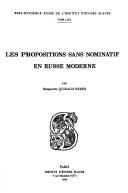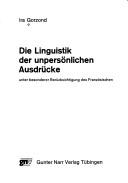| Listing 1 - 10 of 30 | << page >> |
Sort by
|
Book
Year: 1994 Publisher: Frankfurt, Germany : Peter Lang International Academic Publishers,
Abstract | Keywords | Export | Availability | Bookmark
 Loading...
Loading...Choose an application
- Reference Manager
- EndNote
- RefWorks (Direct export to RefWorks)
V predlagaemoj vnimaniju čitatelej knige obsuždajutsja teoretičeskie problemy semantiko-grammatičeskogo opisanija russkich impersonal'nych konstrukcij tipa.
Russian language --- Subjectless constructions. --- Semantics.

ISSN: 00789976 ISBN: 2720402001 9782720402005 Year: 1984 Volume: 69 Publisher: Paris Institut d'études slaves
Abstract | Keywords | Export | Availability | Bookmark
 Loading...
Loading...Choose an application
- Reference Manager
- EndNote
- RefWorks (Direct export to RefWorks)
Book
ISBN: 9789587825435 Year: 2022 Publisher: Bogotá, D.C., Colombia : Ediciones USTA,
Abstract | Keywords | Export | Availability | Bookmark
 Loading...
Loading...Choose an application
- Reference Manager
- EndNote
- RefWorks (Direct export to RefWorks)
Este estudio lingüístico examina la frecuencia de uso del sujeto pronombre personal (SPP) en el español de Bogotá, Colombia, en niños monolingües entre los cinco y ocho años. Esto con el fin de determinar la presencia del sujeto tácito o explícito en sus discursos orales. La investigación analiza las variables de género, edad, persona gramatical, tiempo verbal y discurso contexto para comprender la utilización del SPP en el español como lengua con omisión de sujeto. Además, está fundamentada en teorías de carácter morfosintáctico y programático como cambio y mismo referente, ambigüedad morfológica, peso pragmático y toma de turno para una mayor comprensión del uso del sujeto explícito en la emisión de un mensaje.
Spanish language --- Subjectless constructions. --- Pronoun. --- Discourse analysis.

ISBN: 3631497172 Year: 1996 Publisher: Frankfurt am Main : Lang,
Abstract | Keywords | Export | Availability | Bookmark
 Loading...
Loading...Choose an application
- Reference Manager
- EndNote
- RefWorks (Direct export to RefWorks)
German language --- German language --- Subjectless constructions. --- Verb.
Book
Year: 1968 Publisher: Uppsala : Stockholm : Universitetet, Almqvist & Wiksell,
Abstract | Keywords | Export | Availability | Bookmark
 Loading...
Loading...Choose an application
- Reference Manager
- EndNote
- RefWorks (Direct export to RefWorks)
Russian language --- Russian language --- Syntax. --- Subjectless constructions.
Book
ISBN: 5020283886 Year: 1998 Publisher: Sankt-Peterburg : Nauka,
Abstract | Keywords | Export | Availability | Bookmark
 Loading...
Loading...Choose an application
- Reference Manager
- EndNote
- RefWorks (Direct export to RefWorks)
Russian language --- Semantics. --- Subjectless constructions. --- Syntax.
Book
Year: 1994 Publisher: Frankfurt, Germany : Peter Lang International Academic Publishers,
Abstract | Keywords | Export | Availability | Bookmark
 Loading...
Loading...Choose an application
- Reference Manager
- EndNote
- RefWorks (Direct export to RefWorks)
V predlagaemoj vnimaniju čitatelej knige obsuždajutsja teoretičeskie problemy semantiko-grammatičeskogo opisanija russkich impersonal'nych konstrukcij tipa.
Russian language --- Russian language --- Subjectless constructions. --- Semantics.
Book
Year: 1994 Publisher: Frankfurt, Germany : Peter Lang International Academic Publishers,
Abstract | Keywords | Export | Availability | Bookmark
 Loading...
Loading...Choose an application
- Reference Manager
- EndNote
- RefWorks (Direct export to RefWorks)
V predlagaemoj vnimaniju čitatelej knige obsuždajutsja teoretičeskie problemy semantiko-grammatičeskogo opisanija russkich impersonal'nych konstrukcij tipa.
Russian language --- Russian language --- Subjectless constructions. --- Semantics.

ISBN: 387808241X 9783878082415 Year: 1984 Volume: 241 Publisher: Tübingen: Narr,
Abstract | Keywords | Export | Availability | Bookmark
 Loading...
Loading...Choose an application
- Reference Manager
- EndNote
- RefWorks (Direct export to RefWorks)
Lexicology. Semantics --- French language --- Grammar --- Subjectless constructions --- Syntax --- -French language --- -Langue d'oïl --- Romance languages --- Subjectless constructions. --- Syntax. --- -Subjectless constructions --- Langue d'oïl --- French language - Subjectless constructions --- French language - Syntax
Book
ISSN: 09359249 ISBN: 9783875488920 387548892X Year: 2019 Volume: 26 Publisher: Hamburg : Buske,
Abstract | Keywords | Export | Availability | Bookmark
 Loading...
Loading...Choose an application
- Reference Manager
- EndNote
- RefWorks (Direct export to RefWorks)
What follows expounds empirical and theoretical reasons for a basic, but frequently neglected, differentiation of the subjects of impersonal constructions. An essential difference is the syntactic distinction between a semantically void subject argument on the one hand and an expletive item for an obligatory structural subject position on the other hand. The primary source of evidence will be passive and middle constructions of intransitive verbs in Germanic and Romance languages. The obligatory preverbal subject position of SVO languages is the grammatical source of subject expletives. In the SOV and VSO clause structure, arguably, there is no obligatory VPexternal subject position and therefore no room for expletive subjects. SOV and VSO languages allow for genuinely subjectless clauses. Expletives have to be distinguished from semantically void subject pronouns. The subjects of intransitive middles, for instance, are semantically void arguments of the verb while the structural subject of an intransitive passive, as in French or in Scandinavian languages, is a nonargumental item in a structurally obligatory subject position. Semantically void subjects may be lexical or null, depending on the null-subject property of the given language. Expletive subjects cannot be null. In the linguistic reality, there is no such thing as an “empty expletive”, contrary to widely shared assumptions in the literature. Whenever analyses or descriptions of so-called impersonal constructions confuse the qualities mentioned in the title, they become inconclusive. In the linguistic reality, clauses may be genuinely subjectless or they may contain an expletive subject or a semantically void argumental subject, which, in a null subject language, is phonetically null but syntactically recoverable. What they never contain is a “null expletive subject”. An “empty expletive” is – as shall be demonstrated – a grammatical concept without factual basis. Its motivation rests on an SVObiased perspective on the clause structure of SOV and VSO
Grammar, Comparative and general --- Icelandic language --- Portuguese language --- Subjectless constructions.
| Listing 1 - 10 of 30 | << page >> |
Sort by
|

 Search
Search Feedback
Feedback About
About Help
Help News
News